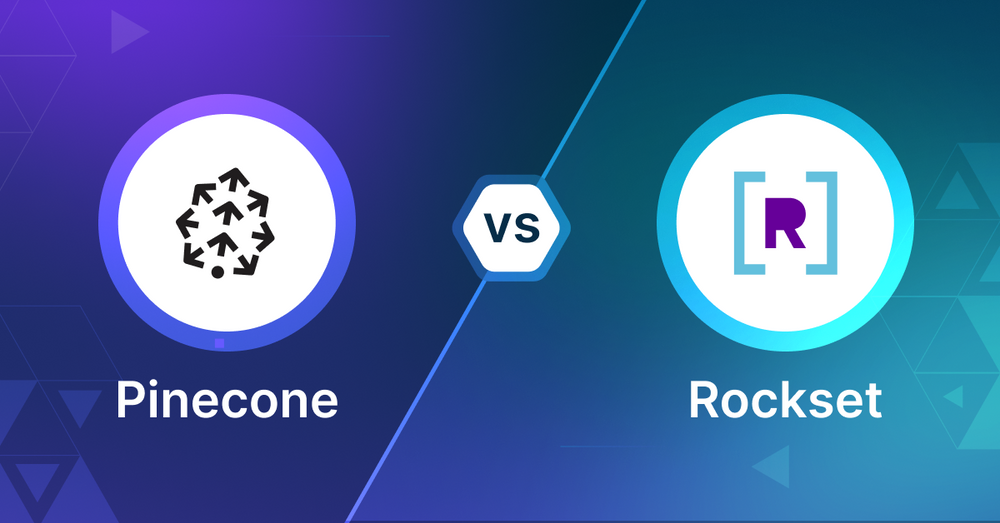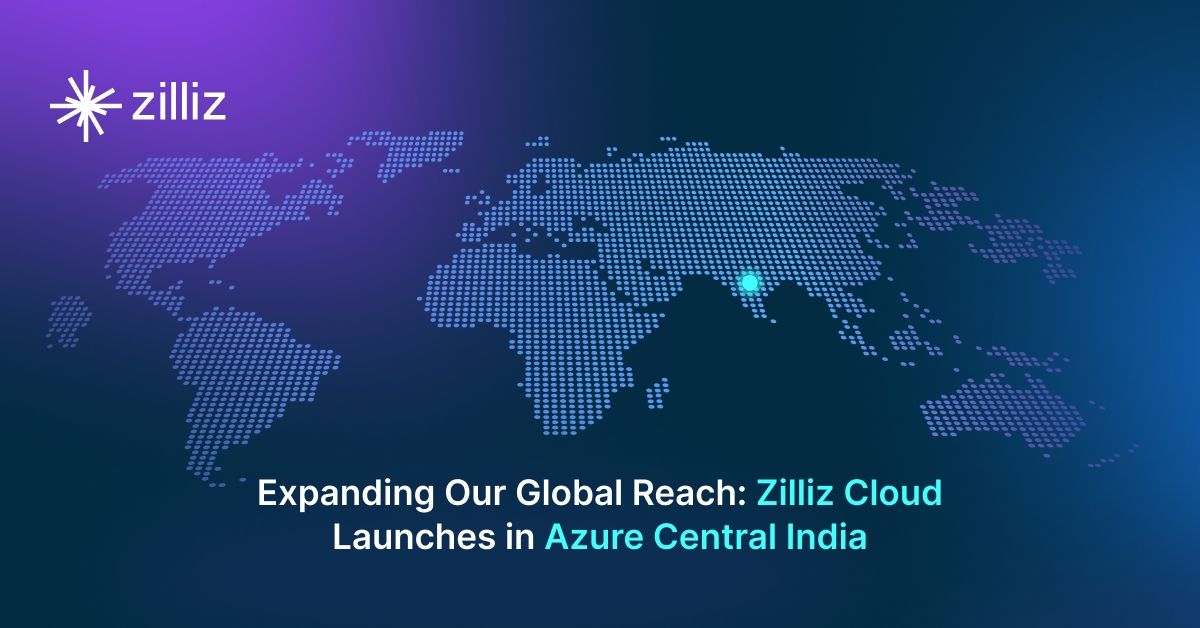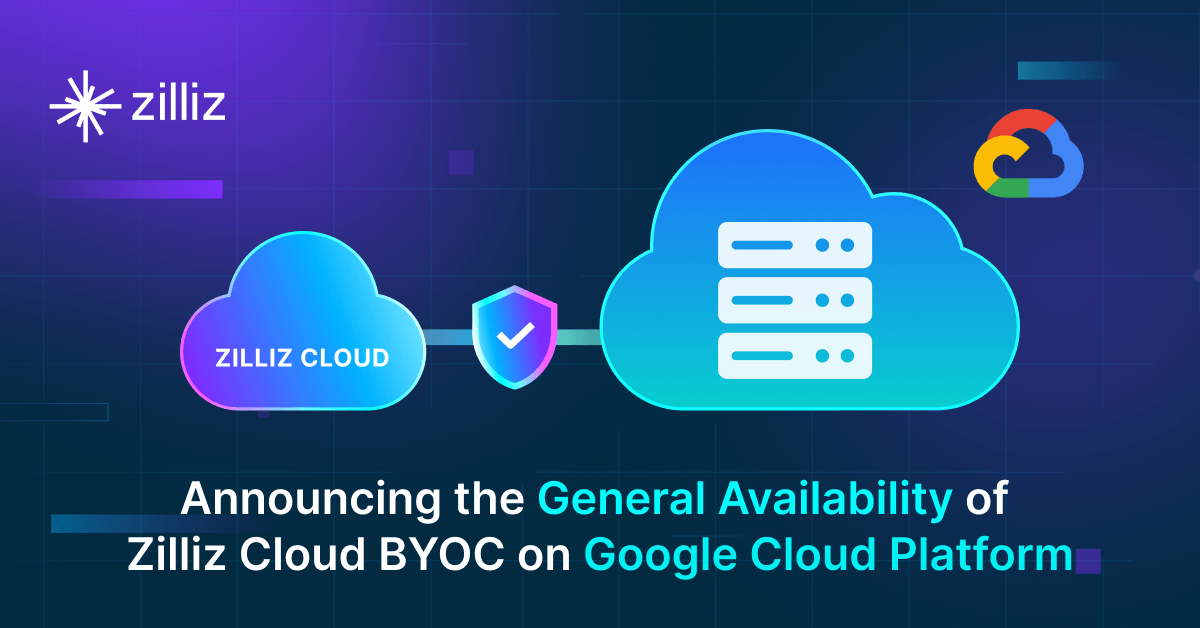Pinecone vs Rockset: Selecting the Right Database for GenAI Applications

As AI-driven applications evolve, the importance of vector search capabilities in supporting these advancements cannot be overstated. This blog post will discuss two prominent databases with vector search capabilities: Pinecone and Rockset. Each provides robust capabilities for handling vector search, an essential feature for applications such as recommendation engines, image retrieval, and semantic search. Our goal is to provide developers and engineers with a clear comparison, aiding in the decision of which database best aligns with their specific requirements.
What is a Vector Database?
Before we compare Pinecone vs Rockset, let's first explore the concept of vector databases.
A vector database is specifically designed to store and query high-dimensional vectors, which are numerical representations of unstructured data. These vectors encode complex information, such as the semantic meaning of text, the visual features of images, or product attributes. By enabling efficient similarity searches, vector databases play a pivotal role in AI applications, allowing for more advanced data analysis and retrieval.
Common use cases for vector databases include e-commerce product recommendations, content discovery platforms, anomaly detection in cybersecurity, medical image analysis, and natural language processing (NLP) tasks. They also play a crucial role in Retrieval Augmented Generation (RAG), a technique that enhances the performance of large language models (LLMs) by providing external knowledge to reduce issues like AI hallucinations.
There are many types of vector databases available in the market, including:
- Purpose-built vector databases such as Milvus, Zilliz Cloud (fully managed Milvus)
- Vector search libraries such as Faiss and Annoy.
- Lightweight vector databases such as Chroma and Milvus Lite.
- Traditional databases with vector search add-ons capable of performing small-scale vector searches.
Pinecone is a purpose-built vector database and Rockset is a search and analytics database with vector search as an add-on. This post compares their vector search capabilities.
Pinecone: The Basics
Pinecone is a SaaS built for vector search in machine learning applications. As a managed service, Pinecone handles the infrastructure so you can focus on building applications not databases. It’s a scalable platform for storing and querying large amounts of vector embeddings for tasks like semantic search and recommendation systems.
Key features of Pinecone include real-time updates, machine learning model compatibility and a proprietary indexing technique that makes vector search fast even with billions of vectors. Namespaces allow you to divide records within an index for faster queries and multitenancy. Pinecone also supports metadata filtering, so you can add context to each record and filter search results for speed and relevance.
Pinecone’s serverless offering makes database management easy and includes efficient data ingestion methods. One of the features is the ability to import data from object storage, which is very cost effective for large scale data ingestion. This uses an asynchronous long running operation to import and index data stored as Parquet files.
To improve search Pinecone hosts the multilanguage-e5-large model for vector generation and has a two stage retrieval process with reranking using the bge-reranker-v2-m3 model. Pinecone also supports hybrid search which combines dense and sparse vector embeddings to balance semantic understanding with keyword matching. With integration into popular machine learning frameworks, multiple language support and auto scaling Pinecone is a complete solution for vector search in AI applications with both performance and ease of use.
Rockset: Overview and Core Technology
Rockset is a real-time search and analytics database for structured and unstructured data, including vector embeddings. Its sweet spot is ingesting, indexing and querying data in real-time so it’s great for applications that need up-to-the-second insights. Rockset supports both streaming and bulk data ingestion, can process high velocity event streams and change data capture (CDC) feeds in 1-2 seconds.
One of Rockset’s key features is Converged Indexing built on mutable RocksDB. This allows for in-place updates of vectors and metadata so it’s super efficient for scenarios where data changes frequently. Rockset can handle documents up to 40MB and supports vector dimensionality up to 200,000 so it’s good for a wide range of vector embedding use cases.
Rockset has vector search built into the core. It supports K-Nearest Neighbors (KNN) and Approximate Nearest Neighbors (ANN) search methods and uses a distributed FAISS index for scalability. Rockset is algorithm agnostic, so you can choose your own search implementation. The cost-based optimizer can dynamically choose between KNN and ANN search methods for optimal performance.
What’s unique about Rockset for vector search is the Converged Index which combines search, ANN, columnar and row indexes into one. This means you can handle a wide range of query patterns out of the box. Rockset also supports metadata filtering and hybrid search. The optimizer will choose the most efficient query path. Can search across multiple ANN fields, supports multi-modal models and has both SQL and REST APIs for query interface.
Key Differences
When choosing between Pinecone and Rockset for vector search you need to understand the differences. Both are powerful but have different approaches that may fit different use cases. Let’s compare them across several key areas to help you make a decision.
Search Methodology
Pinecone uses a custom indexing technique for vector search. Supports real-time updates and works with multiple machine learning models. Pinecone has a two stage retrieval with reranking which can improve search accuracy.
Rockset on the other hand uses a Converged Indexing approach built on RocksDB. This allows for in-place updates of vectors and metadata. Rockset supports K-Nearest Neighbors (KNN) and Approximate Nearest Neighbors (ANN) search methods, with a distributed FAISS index for scalability.
Data
Pinecone is designed for vector embeddings and associated metadata. Works well with unstructured data that has been converted into vector representations.
Rockset can handle structured, semi-structured and unstructured data, including vector embeddings. Supports documents up to 40MB and vector dimensionality up to 200,000 so it’s good for various types of data.
Scalability and Performance
Pinecone has auto-scaling and can handle billions of vectors. Serverless architecture manages the infrastructure, so you can scale easily.
Rockset is built for real-time search and analytics, processes high velocity event streams and change data capture feeds in 1-2 seconds. Distributed architecture allows for horizontal scaling for large datasets.
Flexibility and Customization
Pinecone has namespaces for dividing records within an index which can be useful for multitenancy or organizing data. Also supports metadata filtering and hybrid search, dense and sparse vector embeddings.
Rockset has more flexibility in terms of data modeling and query patterns. Converged Index supports many query types out of the box. Rockset is algorithm-agnostic, so users have more control over search implementation.
Integration and Ecosystem
Pinecone integrates with popular machine learning frameworks and supports multiple languages. Hosts pre-trained models for vector generation and reranking.
Rockset has both SQL and REST APIs for querying so it’s accessible to many developers. Also supports streaming data ingestion and change data capture which is useful for real-time applications.
Ease of Use
Pinecone’s managed service means less operational overhead for you. Serverless and efficient data ingestion (e.g. from object storage) simplifies database management.
Rockset’s SQL interface is familiar to developers with database experience. But its broader feature set may require a steeper learning curve for some users.
Cost
Pinecone’s pricing is based on number of vectors stored and queries performed. Serverless can be cost effective for many use cases, especially with features like efficient data ingestion from object storage.
Rockset’s pricing is based on compute and storage. While more flexible, it may require more resource management to optimize costs.
Security Features
Both Pinecone and Rockset have industry standard security features: encryption at rest and in transit, authentication, access control. Implementation details may vary, so check their docs for the latest info.
When to Choose
Pinecone is the better choice when your main focus is on vector search for machine learning applications, especially large scale semantic search or recommendation systems. It’s great when you need to manage billions of vectors efficiently with real-time updates and low latency queries. Pinecone’s managed service is perfect for teams that want to build AI applications without worrying about the underlying infrastructure. It’s also great for projects that need to deploy quickly and have minimal operational overhead with integration to popular machine learning frameworks and pre-trained models for vector generation and reranking.
Rockset is great for use cases that require real-time analytics and complex queries across multiple data types including but not limited to vector search. It’s perfect for applications that need to ingest, index and query structured, semi-structured and unstructured data in real-time. Rockset’s flexibility in handling different query patterns and support for high velocity event streams makes it great for scenarios where data changes frequently and up-to-the-second insights are critical. Its SQL interface and support for complex joins and aggregations along with vector search makes it a great choice for teams building data intensive applications that go beyond simple vector similarity searches.
Conclusion
Pinecone is great for its focus on vector search, a scalable and managed solution for AI applications. It’s good at large scale vector data, real-time updates and machine learning workflows. Rockset is great for its versatility, supports multiple data types and query patterns and still has vector search. Real-time indexing and querying and complex analytics makes it a powerful tool for data intensive applications. Choose between Pinecone and Rockset based on your use case, the data you’re working with and your performance requirements. Consider the scale of your vector data, the complexity of your queries, need for real-time analytics and your team’s expertise in database management. Align those factors with the strengths of each technology and you’ll make the right choice for your project.
Read this to get an overview of Pinecone and Rockset but to evaluate these you need to evaluate based on your use case. One tool that can help with that is VectorDBBench, an open-source benchmarking tool for vector database comparison. In the end, thorough benchmarking with your own datasets and query patterns will be key to making a decision between these two powerful but different approaches to vector search in distributed database systems.
Using Open-source VectorDBBench to Evaluate and Compare Vector Databases on Your Own
VectorDBBench is an open-source benchmarking tool for users who need high-performance data storage and retrieval systems, especially vector databases. This tool allows users to test and compare different vector database systems like Milvus and Zilliz Cloud (the managed Milvus) using their own datasets and find the one that fits their use cases. With VectorDBBench, users can make decisions based on actual vector database performance rather than marketing claims or hearsay.
VectorDBBench is written in Python and licensed under the MIT open-source license, meaning anyone can freely use, modify, and distribute it. The tool is actively maintained by a community of developers committed to improving its features and performance.
Download VectorDBBench from its GitHub repository to reproduce our benchmark results or obtain performance results on your own datasets.
Take a quick look at the performance of mainstream vector databases on the VectorDBBench Leaderboard.
Read the following blogs to learn more about vector database evaluation.
Further Resources about VectorDB, GenAI, and ML
- What is a Vector Database?
- Pinecone: The Basics
- Rockset: Overview and Core Technology
- When to Choose
- Conclusion
- Using Open-source VectorDBBench to Evaluate and Compare Vector Databases on Your Own
- Further Resources about VectorDB, GenAI, and ML
Content
Start Free, Scale Easily
Try the fully-managed vector database built for your GenAI applications.
Try Zilliz Cloud for FreeKeep Reading

How to Build an Enterprise-Ready RAG Pipeline on AWS with Bedrock, Zilliz Cloud, and LangChain
Build production-ready enterprise RAG with AWS Bedrock, Nova models, Zilliz Cloud, and LangChain. Complete tutorial with deployable code.

Expanding Our Global Reach: Zilliz Cloud Launches in Azure Central India
Zilliz Cloud now operates in Azure Central India, offering AI and vector workloads with reduced latency, enhanced data sovereignty, and cost efficiency, empowering businesses to scale AI applications seamlessly in India. Ask ChatGPT

Announcing the General Availability of Zilliz Cloud BYOC on Google Cloud Platform
Zilliz Cloud BYOC on GCP offers enterprise vector search with full data sovereignty and seamless integration.
The Definitive Guide to Choosing a Vector Database
Overwhelmed by all the options? Learn key features to look for & how to evaluate with your own data. Choose with confidence.